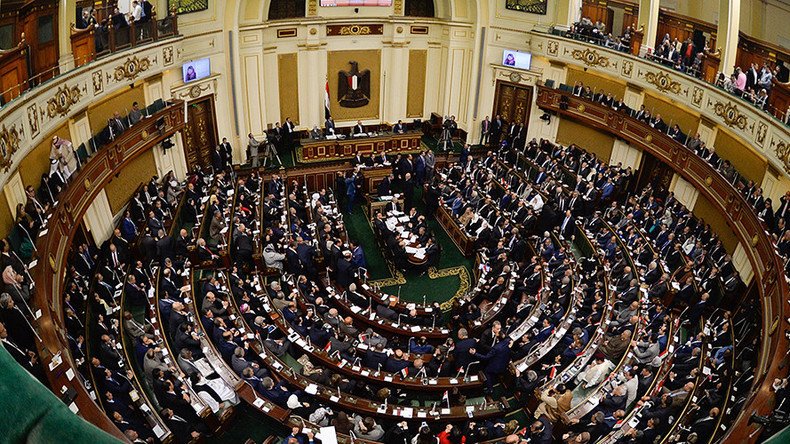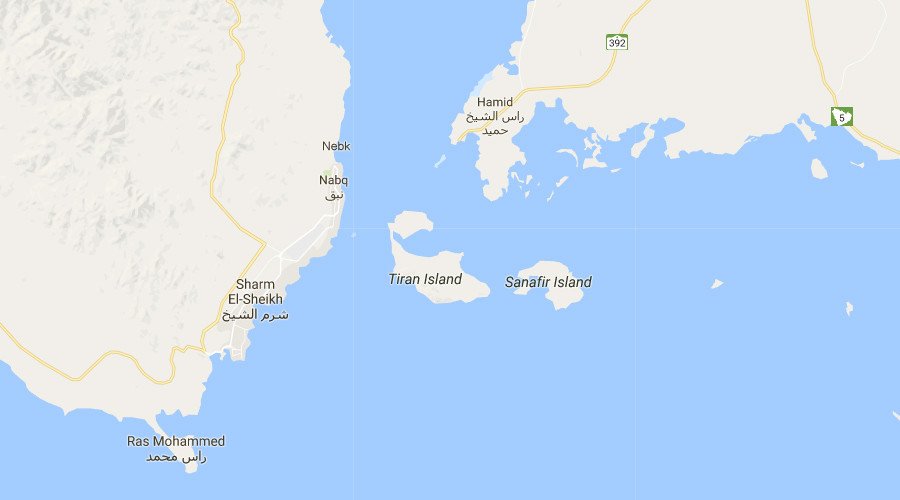Egyptian MPs back disputed handover of 2 key Red Sea islands to Saudi Arabia

Egypt's parliament has approved a treaty to transfer two Red Sea islands to Saudi Arabia, the speaker has announced. The deal has been the subject of a fight in the country’s courts, and has prompted critics to say Cairo is “selling” Egyptian land.
The islands of Tiran and Sanafir located at the mouth of the Gulf of Aqaba (also called the Gulf of Eilat) some decades ago belonged to Saudi Arabia and lie within its territorial waters, but were placed under Egypt's protection during Arab-Israeli tensions in the 1950s.

"I announce the House's final approval of the maritime demarcation agreement with the Kingdom of Saudi Arabia signed on April 8, 2016," House of Representatives Speaker Ali Abdelaal said before adjourning the session, Reuters reported.
The accord to transfer the islands was signed and announced during an April 2016 visit to Cairo by the Saudi king, after being negotiated for over six years.
The announcement prompted massive anti-government protests, with demonstrators taking to the streets to chant, "We own the land and you are agents who sold our land!" Reuters reported at the time.
Although the High Administrative Court ruled against the transfer in January, the Cairo Court for Urgent Matters ruled in April that administrative courts have no jurisdiction over issues relating to national borders.
Lawmakers who supported the deal also persevered following the January ruling, stressing that parliament has the authority to ratify international deals.
The Wednesday approval followed a parliamentary debate earlier in the day, which came after the deal was greenlighted by members of the defense and national security committee in a 35-2 vote.
"There is nothing in the agreement that violates the constitution,'' defense committee chairman Kamal Amer told the house on Wednesday, as quoted by Reuters. "It is designed to realize and perpetuate the mutual interests of the two nations and it also came in response to Saudi requests [to take back the islands] made in 1984, 1989 and 1990."
"The demarcation of the border between Saudi Arabia and Egypt confirmed that the islands are on the side of that brotherly nation, but we are confident that they [the islands] will always be used to serve national Egyptian and Arab security,'' Amer added.
The deal was approved by the house's legislative and constitutional committee on Tuesday, following a three-day review period which saw lawmakers get into heated arguments and push and shove each other. It eventually passed in a 35-8 vote, member of parliament Mostafa Bakry told AFP.
The treaty will now be passed on to President Abdel Fattah el-Sisi for his signature.
The Wednesday approval of the deal comes just one day after opponents of the agreement clashed with police in downtown Cairo, hours after the legislative and constitutional committee approved the deal. A number of arrests were made, with at least eight demonstrators still in custody on Wednesday, according to rights lawyers cited by AP.
Critics of the deal say the agreement equates to giving up land.
The two sides signed at least 15 agreements at the time of the king's visit in April 2016, The New York Times reported, citing state media. One of those deals included Riyadh agreeing to finance Cairo's petroleum needs for five years with a $22 billion soft loan and facilitated payments, Ahram Online reported.
He sold our land ... #Tiran_Sanafir are our islands #جمعة_الارض
— Hager Fathy (@perdita512) April 15, 2016
Following the announcement, many took to social media to call al-Sisi "Awaad," referring to a character in an Egyptian song who had sold his land.
Chants against #Sisi's shameless handover of two Red Sea islands to his Saudi royal masters. #Egypt#Tiran_Sanafirpic.twitter.com/zGsPuQ4diw
— Jano Charbel (@JanoCharbel) June 13, 2017
Khaled Dawoud, leader of the opposition Dostour (Constitution) party, said the Wednesday approval will create a "deep rift" between the government and a signification number of Egyptians.
"Ratifying the agreement in this manner will create a deep rift between the president and a large segment of society," he said, as quoted by AP. "It is a turning point in our relationship with the president."
The island of Tiran controls a narrow shipping lane leading to and from the Israeli port of Eilat and the Jordanian port of Aqaba. Egypt's closure of that lane was one of the reasons behind the 1967 Arab-Israeli war. Egypt lost the entire Sinai Peninsula as a result of the armed conflict.













